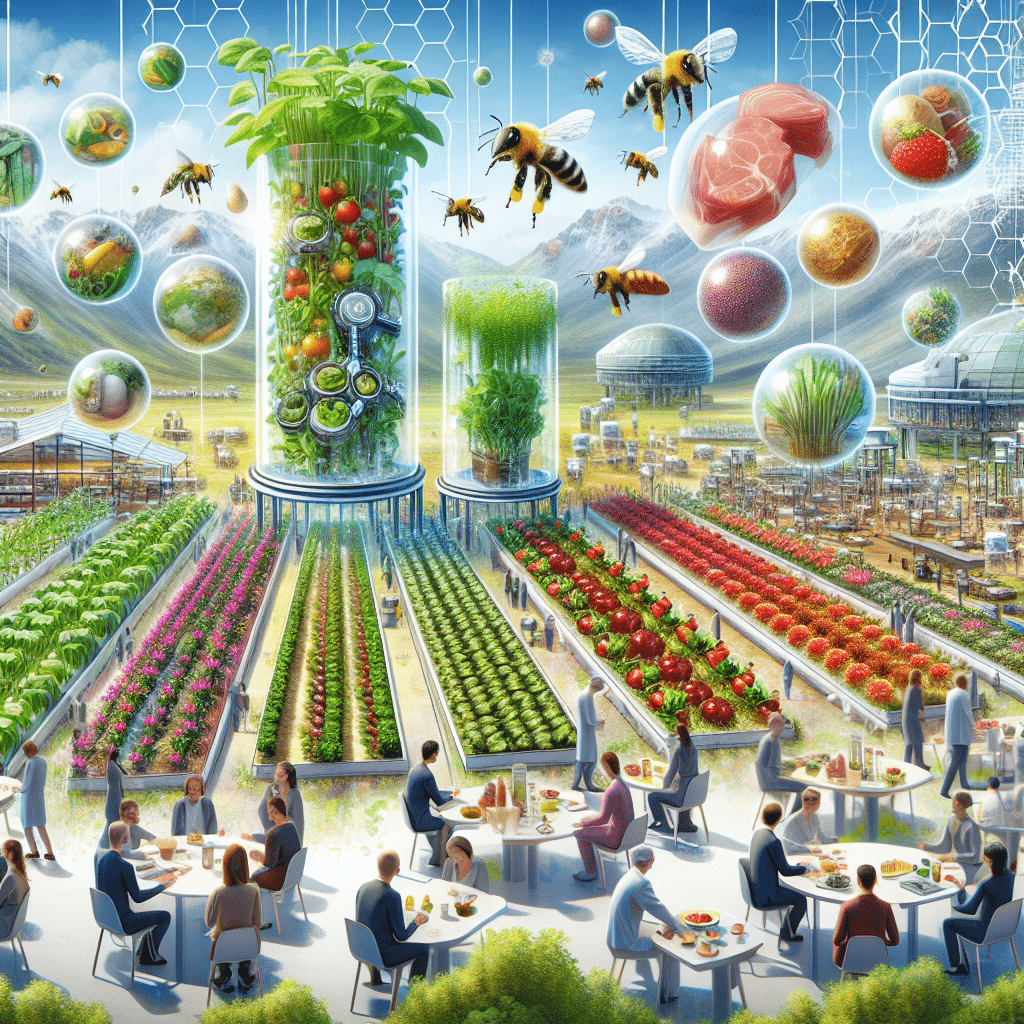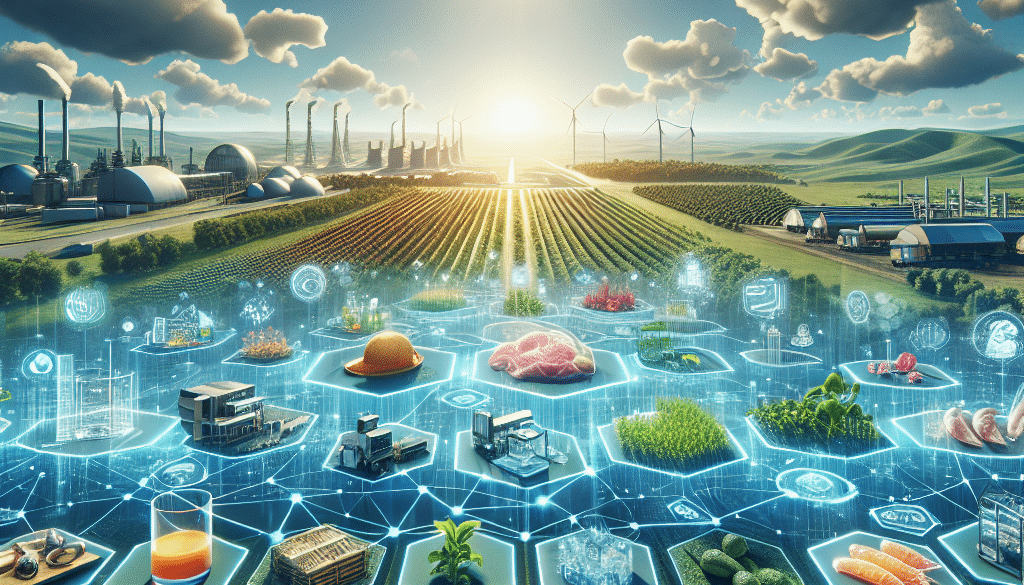Food Innovation Landscape: On the Horizon’s Latest Developments
-
Table of Contents
- Food Innovation Landscape: Cutting-Edge Developments on the Horizon
- 1. The Rise of Plant-Based Alternatives
- 2. Technological Innovations in Agriculture
- 3. Personalized Nutrition and Functional Foods
- 4. Sustainable Packaging Solutions
- 5. Food Safety and Traceability Enhancements
- 6. The Emergence of Alternative Proteins
- Conclusion
- ETprotein: Your Source for High-Quality Protein Products
Food Innovation Landscape: Cutting-Edge Developments on the Horizon

The food industry is undergoing a transformation, driven by technological advancements, sustainability concerns, and changing consumer preferences. As we look to the future, the horizon is brimming with innovative developments that promise to reshape our food systems. This article delves into the latest trends and breakthroughs in food innovation, offering a glimpse into what we can expect in the coming years.
1. The Rise of Plant-Based Alternatives
One of the most significant shifts in the food industry is the move towards plant-based alternatives. Driven by concerns over health, the environment, and animal welfare, consumers are increasingly seeking out meat and dairy substitutes. Companies are responding with a range of innovative products that mimic the taste, texture, and nutritional profile of animal-based foods.
- Impossible Foods and Beyond Meat continue to refine their plant-based meat offerings, with improvements in taste and texture that are winning over even the most ardent meat lovers.
- Oatly and other plant-based milk brands are expanding their product lines to include a variety of dairy-free options, from ice cream to yogurt.
- Cell-cultured meat, still in its infancy, is poised to disrupt the market with real meat grown from animal cells, without the need for traditional livestock farming.
2. Technological Innovations in Agriculture
Technology is revolutionizing agriculture, making it more efficient, sustainable, and resilient. Innovations such as precision farming, vertical farming, and CRISPR gene editing are paving the way for a new era of food production.
- Precision agriculture uses data analytics, IoT devices, and AI to optimize crop yields and reduce waste.
- Vertical farming, which involves growing crops in stacked layers, often indoors, maximizes space and can reduce water usage by up to 70%.
- CRISPR technology allows for precise genetic modifications to crops, potentially leading to higher yields, disease resistance, and reduced pesticide use.
3. Personalized Nutrition and Functional Foods
As consumers become more health-conscious, there is a growing demand for personalized nutrition and functional foods that cater to individual dietary needs and health goals.
- Companies like Habit and DNAfit offer personalized nutrition plans based on genetic testing, helping individuals tailor their diets to their unique biology.
- Functional foods, enriched with beneficial ingredients like probiotics, omega-3 fatty acids, and plant sterols, are becoming more prevalent, offering added health benefits beyond basic nutrition.
4. Sustainable Packaging Solutions
Sustainability is a pressing concern in the food industry, with packaging being a major focus. Innovations in this area aim to reduce waste and environmental impact.
- Edible packaging, made from natural materials like seaweed, is being developed as a zero-waste alternative to traditional plastic.
- Biodegradable and compostable packaging materials are gaining traction, with companies like TIPA leading the way in sustainable packaging solutions.
- Loop, a circular shopping platform, partners with brands to offer products in reusable containers that can be returned and refilled.
5. Food Safety and Traceability Enhancements
Ensuring the safety and traceability of food is paramount. Blockchain technology is emerging as a key tool in achieving greater transparency and accountability in the food supply chain.
- IBM’s Food Trust blockchain platform allows for the tracking of food products from farm to table, enhancing traceability and reducing the risk of foodborne illnesses.
- Smart labels and sensors are being integrated into packaging to monitor food freshness and safety throughout the supply chain.
6. The Emergence of Alternative Proteins
Alternative proteins are gaining popularity as consumers seek more sustainable and ethical sources of protein. This sector includes not only plant-based proteins but also insect-based and lab-grown options.
- Companies like Entomo Farms are normalizing the consumption of insects as a protein source, offering products like cricket powder.
- Lab-grown seafood, such as that produced by BlueNalu, provides a sustainable alternative to overfished ocean species.
Conclusion
The food innovation landscape is rich with developments that promise to transform how we produce, consume, and think about food. From plant-based alternatives to technological advancements in agriculture, personalized nutrition, sustainable packaging, enhanced food safety, and alternative proteins, the horizon is filled with exciting opportunities. These innovations not only cater to the evolving demands of consumers but also address critical global challenges such as sustainability, health, and food security.
ETprotein: Your Source for High-Quality Protein Products
In line with the latest trends in food innovation, ETprotein offers a range of high-quality protein products that cater to the growing demand for sustainable and health-conscious options. Their extensive selection of organic bulk vegan proteins and L-(+)-Ergothioneine (EGT) is perfect for consumers and manufacturers looking to embrace the future of food.
Whether you’re interested in plant-based nutrition or seeking innovative ingredients for your food products, ETprotein’s offerings are at the forefront of the food innovation landscape. With a commitment to quality, sustainability, and customer satisfaction, ETprotein is your ideal partner in exploring the exciting world of food innovation.
About ETprotein:
ETprotein, a reputable protein and L-(+)-Ergothioneine (EGT) Chinese factory manufacturer and supplier, is renowned for producing, stocking, exporting, and delivering the highest quality organic bulk vegan proteins and L-(+)-Ergothioneine. They include Organic rice protein, clear rice protein, pea protein, clear pea protein, watermelon seed protein, pumpkin seed protein, sunflower seed protein, mung bean protein, peanut protein, and L-(+)-Ergothioneine EGT Pharmaceutical grade, L-(+)-Ergothioneine EGT food grade, L-(+)-Ergothioneine EGT cosmetic grade, L-(+)-Ergothioneine EGT reference grade and L-(+)-Ergothioneine EGT standard. Their offerings, characterized by a neutral taste, non-GMO, allergen-free attributes, with L-(+)-Ergothioneine purity over 98%, 99%, cater to a diverse range of industries. They serve nutraceutical, pharmaceutical, cosmeceutical, veterinary, as well as food and beverage finished product distributors, traders, and manufacturers across Europe, USA, Canada, Australia, Thailand, Japan, Korea, Brazil, and Chile, among others.
ETprotein specialization includes exporting and delivering tailor-made protein powder and finished nutritional supplements. Their extensive product range covers sectors like Food and Beverage, Sports Nutrition, Weight Management, Dietary Supplements, Health and Wellness Products, and Infant Formula, ensuring comprehensive solutions to meet all your protein needs.
As a trusted company by leading global food and beverage brands and Fortune 500 companies, ETprotein reinforces China’s reputation in the global arena. For more information or to sample their products, please contact them and email sales(at)ETprotein.com today.












